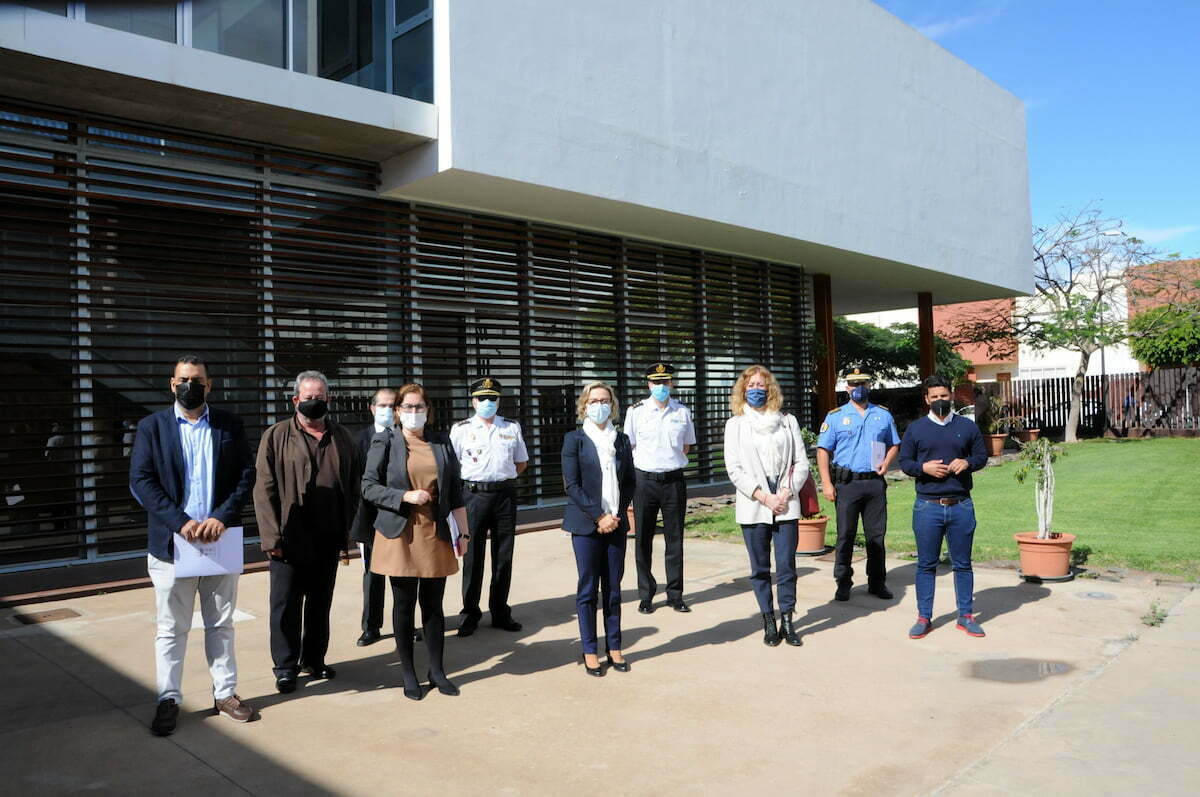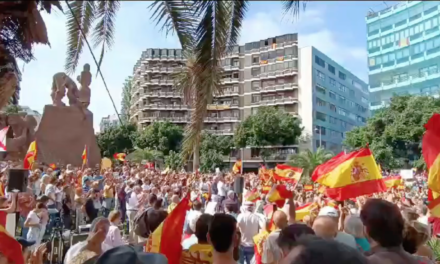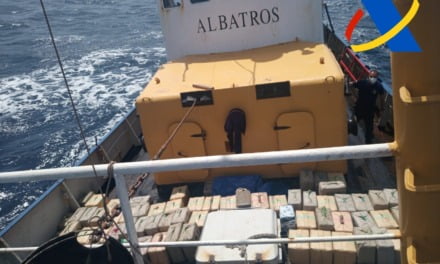The Spanish Government has confirmed that they are now increasing the pace of the migrant transfers away from empty tourism establishments on Gran Canaria. According to sub-delegate of the Spanish Government in Las Palmas, Teresa Mayans, by Sunday Aguineguín Park apartments will have been completely emptied of the last 100 people remaining there, and then begins the transfers of foreign migrants staying in the Waikiki hotel to what are being controversially termed as “humanitarian camps”. There are around 4,600 irregular migrants still accommodated in the hotels on the south of Gran Canaria, including around 800 minors explained the deputy delegate yesterday, and the Spanish State is working on increasing migrant transfers to fulfill its commitment to vacate the rest of the hotels as soon as possible following their exceptional use over recent months to respond to the ongoing migration crisis in the Canary Islands.
Teresa Mayans yesterday attended local security board meetings scheduled with each of the municipalities of Mogán and San Bartolomé de Tirajana, to evaluate the actions currently implemented to control incidents reported or thought to be carried out by migrants sheltered in accommodation complexes. Both meetings reported a reduction of around fifty percent in the number of incidents related to the presence of migrants. “The feeling of insecurity has improved and circumstances that give rise to subsequent reactions or xenophobic outbreaks have also improved”, which is a matter on which the sub-delegate of the Spanish Government in Las Palmas had showed great concern at the previous meetings. “The number of incidents is minimal and those who use hoaxes to encourage xenophobia will be prosecuted,” Mayans said.
The migration security coordination meetings occur weekly in order to monitor the management of the current migratory upswing, migrant transfers and the difficulties experienced in the reception of migrants. The Government Sub-delegation together with the Town Council, the Minors’ Directorate, the security forces and the Red Cross analyse the progress made during the last week, contrasting data and pooling the necessary resources for the correct management of the reception of migrants.
On the subject of citizen security, Mayans stressed that “the data is conclusive and crime has not increased despite what some people maintain” and pointed out that “the Canarian people have always been a welcoming and tolerant people”.
 Mayor Conchi Narvaez declared that “from the coordination of the different administrations and security forces, normality is being restored. The Government delegation has found the resource for humanitarian reception and the hotels will no longer be used for this purpose, so that as soon as the sanitary restrictions are lifted, tourism can return”.
Mayor Conchi Narvaez declared that “from the coordination of the different administrations and security forces, normality is being restored. The Government delegation has found the resource for humanitarian reception and the hotels will no longer be used for this purpose, so that as soon as the sanitary restrictions are lifted, tourism can return”.
Yolanda Iratxe Serrano Ávila, General Director of Child and Family Protection for the Government of the Canary Islands joined by video call and said she appreciates the willingness and constant communication with the San Bartolomé de Tirajana Town Council pointing out that no serious incidents have been reported this week at the four facilities being used for care unaccompanied foreign minors.
About 4,600 people are still staying in hotel establishments, 2,200 of them in Mogán
 “In the municipality the incidence rate has dropped and that is palpable in the population,” said the Mayor, herself, and explained that this has been due to the visible presence of 22 reinforcement agents from the Guardia Civil Reserve and Security Group and Mogán’s own Local Police force. Mayans too stated that “the feeling of insecurity has improved and I think those circumstances that lead to subsequent actions or xenophobic outbreaks too, which is a matter that worries me a lot ”.
“In the municipality the incidence rate has dropped and that is palpable in the population,” said the Mayor, herself, and explained that this has been due to the visible presence of 22 reinforcement agents from the Guardia Civil Reserve and Security Group and Mogán’s own Local Police force. Mayans too stated that “the feeling of insecurity has improved and I think those circumstances that lead to subsequent actions or xenophobic outbreaks too, which is a matter that worries me a lot ”.
The Mogán security board also addressed the need to speed up age determination tests for all those claiming to be minors. The Canary Islands Government have estimated that among the 2,652 minors currently under its guardianship across the archipelago as many as 20% of them could be adults. The mayor requested the activation of a “crash plan” to accelerate bone tests, and confirm exactly how many of those claiming to be under 18 have done so falsely and therefore not under the direct protection of the Regional Government of the Canary Islands, as all adult migrants are the responsibility of the Spanish State. The Canary Islands Deputy Minister for Social Rights, Gemma Martínez, stated that the existing age-determination protocol, between the Prosecutor’s Office for Minors, the Institute of Legal Medicine and the National Police, is not going as fast as they would like, are there are still some 2,000 verifications pending. “Until the tests are done and the age of these people is determined, documentation cannot be given to them and they cannot be sent to schools or training centers,” concluded the deputy minister.
The Government of the Canary Islands working to speed up bone tests for minors
Spain’s Government delegate in the Canary Islands, Anselmo Pestana, this Friday held several important meetings with representatives of various organisations to gain greater understanding of migration in The Canary Islands.
The president of the Association of Arab and Maghreb Women, Fátima Louraibi, who is an advisor on immigration, expressed her concern about the situation of migrants who are living on the streets and asked the delegate to prioritise their deportations, because they are without resources and are no longer in the care of any non-governmental organisations. Additionally, she pointed out that many migrants have shown interest in being returned back to their countries of origin on a voluntary basis, rather than continuing to stay in the archipelago.
Pestana also met with the Diputado for Las Palmas Luc André Diouf, himself a migrant and immigration expert, to discuss the situation on the Islands. Pastana described the meeting with Spain’s first diputado of Senegalese origin as “A very enriching meeting given the knowledge and sensitivity this parliamentarian” brought to perspectives on the reality of migrant arrivals, migrant transfers and the difficulties they find once they reach Spain.
According to Mogán local activist Carmelo Suarez Santana, who has been a spokesperson for local residents protesting against the presence of migrants in hotels, his meeting with Pestana on Friday resulted in confirmation that, “before the end of the first quarter of this year, there will be no migrants staying in hotels in the Municipality of Mogán.”










